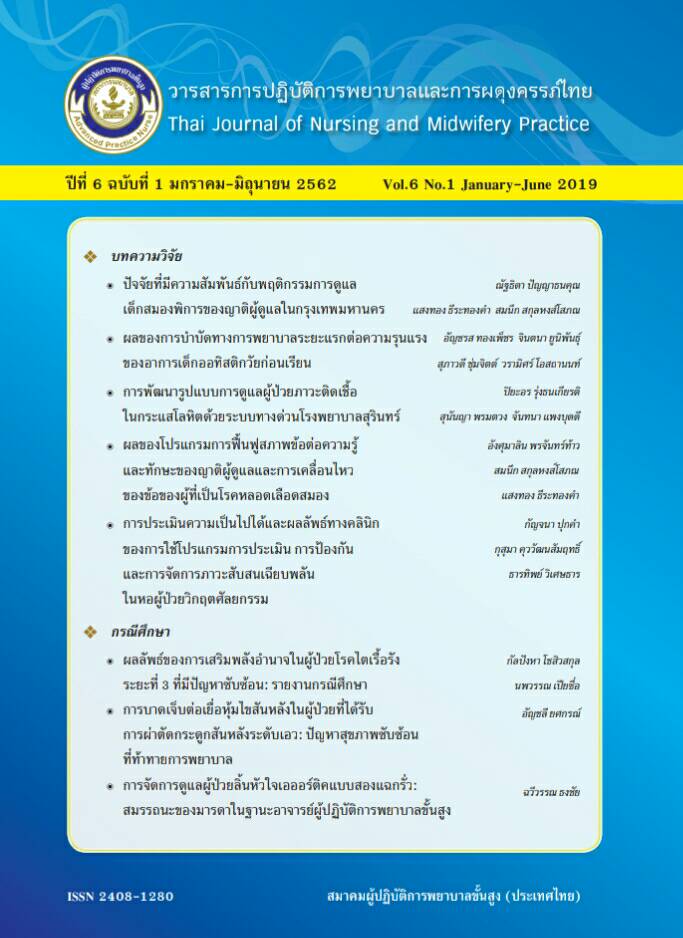ผลของการบำบัดทางการพยาบาลระยะแรกต่อความรุนแรงของอาการเด็กออทิสติกวัยก่อนเรียน
Main Article Content
บทคัดย่อ
บทคัดย่อ:
ความรุนแรงของอาการเด็กออทิสติกส่งผลกระทบต่อทั้งตัวเด็กและผู้ดูแล การวิจัยกึ่งทดลองแบบวัดผลก่อนและหลังเปรียบเทียบระหว่างกลุ่มทดลองกับกลุ่มควบคุมนี้ มีวัตถุประสงค์เพื่อ ศึกษาผลของการบำบัดทางการพยาบาลระยะแรกต่อความรุนแรงของอาการเด็กออทิสติกวัยก่อนเรียน กลุ่มตัวอย่าง คือ เด็กออทิสติกวัยก่อนเรียนที่เข้ารับการรักษาแผนกผู้ป่วยนอก จำนวน 30 คน เป็นกลุ่มทดลอง จำนวน 15 คน ได้รับการบำบัดทางการพยาบาลระยะแรกโดยผู้ปฏิบัติการพยาบาลขั้นสูง ส่วนกลุ่มควบคุม จำนวน 15 คน ได้รับการพยาบาลตามปกติ เครื่องมือที่ใช้ในการทดลอง คือ การบำบัดทางการพยาบาลระยะแรก ประกอบด้วย การเล่นบำบัด กลุ่มสร้างเสริมพลังอำนาจ กลุ่มสร้างเสริมพัฒนาการเด็กออทิสติกด้านการเคลื่อนไหวและกล้ามเนื้อมัดเล็ก และการให้คำปรึกษารายบุคคล ใช้เวลาทั้งหมด 4 สัปดาห์ วิเคราะห์ความแตกต่างของความรุนแรงของอาการออทิสติก ระยะก่อนและหลัง ของกลุ่มทดลองและกลุ่มควบคุม ด้วยสถิติ Wilcoxon Signed Rank Test และวิเคราะห์ความแตกต่างของความรุนแรงของอาการเด็กออทิสติก ระหว่างกลุ่มทดลองและกลุ่มควบคุม ด้วยสถิติ Mann-Whitney U test ผลการศึกษาพบว่า ในกลุ่มทดลอง ความรุนแรงของอาการเด็กออทิสติกหลังได้รับการบำบัดทางการพยาบาลระยะแรกลดลงทุกคนอย่างมีนัยสำคัญทางสถิติที่ระดับ .05 โดยกลุ่มทดลอง มีค่าผลต่างของคะแนนความรุนแรงของอาการในเด็กออทิสติกก่อน–หลังการทดลอง มากกว่าในกลุ่มควบคุม ผลการศึกษานี้เสนอแนะว่า การบำบัดทางการพยาบาลระยะแรกสามารถนำมาใช้เพื่อลดความรุนแรงของอาการในเด็กออทิสติกได้
Downloads
Article Details
เอกสารอ้างอิง
2. Atharia P, Ghaedia L, Kosnin AM. Mothers' depression and stress, severity of autism among children and family income. Int J Psychol Res 2013;6(2): 98-106.
3. Royeyers H, Warreyn P. Parenting in families with a child with autism spectrum disorder and a typically developing child: Mother's experiences and cognitions. Research in Autism Spectrum Disorders 2010;4:661-9.
4. Shields J. The NAS early bird programme: Partnership with parents in early intervention.
The National Autistic Society 2001;5:49-56.
5. Filipek PA, Accardo PJ, Ashwal S, Baranek GT, Cook EH, Dawson G, et al. Practice parameter: Screening and diagnosis of autism. Report of the Quality Standards Subcommittee of the American Academy of Neurology and the Child Neurology Society;2000:55.
6. Beurkens NM, Hobson JA, Hobson RP. Autism severity and qualities of parent-child relations. Journal of Autism and Developmental Disorders 2013;43: 168–78.
7. Talib TL. Relations between age, autism severity, behavioral treatment and the amount of time in regular education classrooms among students with autism (Order No. 3521871). 2012. Available from: ProQuest Dissertations & Theses Global.
8. Yunibhand J. Unit 8 Child and adolescent psychiatric nursing. Mental health and psychiatric nursing. Department of Nursing Science, Sukhothai Thammathirat University. Nonthaburi: Sukhothai Thammathirat University Press;2001. (In Thai)
9. Miller JF. Coping with chronic illness: Overcoming powerlessness. 2nd ed. Philadelphia, FA Davis;1992.
10. Beyer J, Gammeltoft L. Autism & Play. 2nd ed. London and Philadelphia: Jessica Kingsley Publisher:2001.
11. Gesell A, Ilg FL. Child development: An introduction to the study of human growth. New York: Harper;1949.
12. Glasser W. Station of the mind: New directions for reality therapy. New York: Harper & Row Pub;1981.
13. Polit DF, Beak CT. Nursing research: Principle and method. 7th ed. Philadelphia: Lippincott Williams & Wilkins;2004.
14. Eikeseth S, Klintwall L, Jahr E. Outcome for children with autism receiving early and intensive behavioral intervention in mainstream preschool and kindergarten settings. Research in Autism Spectrum Disorders 2012;6(2):829–35.
15, Rimland B, Edelson SM. Autism Treatment Evaluation Checklist. Available from: https://www.autism.com/atec/2000.
16. Muangmamanirat W. Relationship between selected factors social support and the ability to care for people who depending on of mothers of autistic children. [Master thesis of Nursing Science]. Department of Mental Health and Psychiatric Nursing, Chiang Mai University;2004. (In Thai)
17. Polit DF, Beck CT. Nursing research: Generating and assign evidence for nursing practice. 8th ed. Philadelphia: Lippincott;2008.
18. Chamchuri D, Yunibhand J. Research report of empowerment to manage illness of chronic disease of patients in the Thai social context. Bangkok: the Agricultural Co-operative Federation of Thailand;2002. (In Thai)
19, Buala S. The effect of playing therapy with family on Autism child behavior problems. [Master thesis]. Department of Mental Health and Psychiatric Nursing, Faculty of Nursing, Chulalongkorn University;2013. (In Thai)
20. Burns N, Grove SK. The practice of nursing research conduct, critique, and utilization. 5th ed. St. Louis, Elsevier Saunders;2005.
21. Roberts J, Williams K, Carter M, Evans D, Parmenter T, Silove N, et al. A randomised controlled trial of two early intervention programs for young children with autism: Centre-based with parent program and home-based. Research in Autism Spectrum Disorders .2011; 5(4) : 1553-1566.


